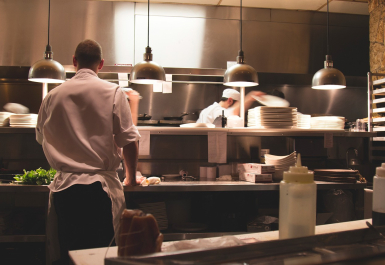Chefs, like professionals in any field, consider multiple factors when searching for a new job. These factors vary based on individual preferences and career goals. However, common considerations include:
Business-specific factors:
Menu and Cuisine: The type of cuisine and menu offerings are crucial. Chefs may want to work with a particular type of cuisine they are passionate about or have expertise in. The cuisine type can be easily found on the restaurants and job tiles. The job seeker can also filter businesses and jobs based on their desired style.

Culinary Philosophy and Style: Chefs often seek positions that align with their culinary philosophy and style. They may look for a restaurant or kitchen that shares their values and creative approach to cooking. This information can be shared on the profile page. The culinary philosophy and style will also be evident in the images that are shared, so choose wisely!
Reputation and Prestige: Many chefs are attracted to restaurants or establishments with a strong reputation or prestigious awards. The equivalent of a Michelin star in Australia to see the restaurant referred to as being Hatted. This gives the chef a good idea of the food and service aspirations of the venue. The restaurant's Profile Page has a section dedicated to its awards and achievements, making it easier to find that perfect match.
Location: The location of the restaurant matters. Some chefs may want to work in specific cities or regions known for their culinary scene, while others may prefer a quieter or more rural setting. Exactly where the role is located within a city is also important, while most would dream of living in Bondi when they arrive, this might not be sustainable if they are working in Manly. Locimo has a map view, so job seekers can easily see where the venue is located to help with the logistics of finding the job in the right location.
Career Growth and Advancement: Opportunities for career growth and advancement are crucial. Chefs often seek positions that provide a path to higher levels of responsibility, such as becoming an executive chef or opening their own restaurant. We recommend sharing these success stories of where staff have moved to, as this can give the job seeker a very good idea of how they could grow professionally, and if the restaurant is the right fit for their own personal career aspirations.
Networking and Industry Connections: Who exactly would the chef be working with? Building and expanding their network in the culinary industry is crucial for career development. Some chefs may consider positions that provide opportunities to connect with influential figures or other professionals in the field. This is why we have included sections that include information about the existing Head Chef working at the restaurants or sharing information about the key figures in the team, acting as a draw card to get the right candidates to apply.
Sustainability and Ethical Practices: Chefs who prioritize sustainability and ethical practices may seek out restaurants that share their commitment to sourcing local, organic ingredients, minimizing food waste or participating in any charitable events. We encourage the restaurant to share this information on their profile page.
Role-Specific Factors
The following factors are more role-specific and should be considered when writing the job advertisement:
Level of Autonomy: It is important to share if the role will have a significant degree of creative control and autonomy over the menu and kitchen operations, as this could be a priority for the chef and can help the restaurant find the perfect match for the open position, a win-win for both parties.
Benefits and Perks: Benefits such as health insurance, retirement plans, and other perks like meal discounts or culinary training opportunities can influence a chef's decision.
Work-Life Balance: Balancing work and personal life is essential. Some chefs prefer positions that offer more predictable schedules and time off, while others thrive in high-pressure, demanding environments. It is vital that the restaurant is clear about the expectations required to be successful in the role, to ensure the long-term success of the placement.
Salary and Compensation: Compensation is a significant factor. Chefs may look for competitive salaries, bonuses, or profit-sharing arrangements, depending on their level of experience and the restaurant's financial structure.
Stability and Longevity: Job stability and the long-term outlook of the restaurant or establishment can be significant factors, especially for chefs looking for a lasting commitment. On the other side of the spectrum is the chef who is visiting Australia on a Working Holiday visa and would be looking for a short-term contract, as they would need to change employers every six months.
Ultimately, chefs also consider their personal goals, values, and aspirations when choosing a new job. These may include a desire to experiment with new techniques, contribute to charitable causes, or pursue other non-traditional culinary ventures. As a business that is actively looking for chefs, maximise your chances of attracting the right chef by presenting the above-mentioned points. If you are ready to amplify your restaurant's unique employer brand to help attract chefs, visit the sign-up page and set up your profile now - it's free.



